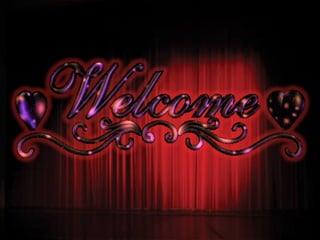
Dramaku in Intro to Literature
- 5. What Is Drama? Drama is a composition in prose form that presents a story entirely told in dialogue. It´s a story enacted onstage for a live audience.
- 6. OrIGINs OF Drama The word drama comes from the Greek verb dran, which means “to do” or “to act” The earliest known plays... were written around the fifth century B.C. produced for festivals to honor Dionysus, the god of wine and fertility.
- 8. 1. Ancient Drama 2. Medieval Drama 3. Restoration And 18th-Century Drama 4. 19th Century Drama and The Romantic Rebellion 5. The Modern Drama
- 9. 6. Symbolist Drama 7. Expressionist Drama 8. Ensemble Theatre 9. Absurdist Theatre 10. Contemporary Drama
- 11. traGEDY A tragedy is a play that ends unhappily. Most classic Greek tragedies deal with serious, universal themes such as : right and wrong justice and injustice life and death
- 12. mELODrama It shows events that follow each other rapidly, but seems to be governed always by chance. The characters are victims in the hands of merciless fate.
- 13. COmEDY A comedy is a play that ends happily. The plot usually centers on a romantic conflict. boy meets girl boy loses girl boy wins girl
- 14. FarCE Farce is a sub-category of comedy, characterized by greatly exaggerated characters and situations. Farces typically involve mistaken identities, lots of physical comedy and outrageous plot twists.
- 15. musICaL In musical theater, the story is told not only through dialogue and acting but through music and dance. Musicals are often comedies, although many do involve serious subject matter.
- 16. traGICOmEDY It is a play that does not adhere strictly to the structure of tragedy. There is a mix of comedy and Tragedy side by side in these types of plays. It focuses on character relationships and shows society in a state of continuous flux.
- 17. OPEra Western opera is a dramatic art form, which arose during the Renaissance in an attempt to revive the classical Greek drama tradition in which both music and theatre were combined.
- 18. PaNtOmImE These stories follow in the tradition of fables and folk tales. Usually there is a lesson learned, and with some help from the audience, the hero / heroine saves the day. This kind of play uses stock characters seen in masque and again commedia dell'arte, these characters include the villain (doctore), the clown / servant (Arlechino / Harlequin / buttons), the lovers etc.
- 19. CrEatIvE Drama Creative drama includes dramatic activities and games used primarily in educational settings with children. Its roots in the United States began in the early 1900s. Winifred Ward is considered to be the founder of creative drama in education, establishing the first academic use of drama in Evanston, Illinois.
- 21. Like the plot of a story, the plot of a play involves characters who face a problem or conflict. Climax point of highest tension; Plot: action determines how the conflict will be Sequence of events that develop resolved the drama (complications) Resolution Exposition conflict is resolved; characters and conflict are play ends introduced
- 22. Conflict is a struggle or clash between opposing characters or forces. A conflict may develop . . . between characters who want different things or the same thing between a character and his or her circumstances within a character who is torn by competing desires
- 24. There are three types of Drama Elements. 1. Literary 2. Technical 3. Performance
- 25. 1. LItErarY ELEmENts (What is needed to write a script or story?) Script Plot Character Story Organization Setting Dialogue Monologue /soliloquy/aside Conflict
- 26. 2. tEChNICaL ELEmENts (What is needed to produce a play?) Scenery Costumes Props Sound and Music Make-up
- 27. 3. PErFOrmaNCE ELEmENts (What do the actors do on stage to make a character come alive?) Acting Speaking Non-verbal Expression
- 29. 1. sIzE OF staGE a) “Thrust” stage The stage extends into the viewing area. The audience surrounds the stage on three sides.
- 30. b) “In the round” stage is surrounded by an audience on all sides.
- 31. c) “Proscenium” stage is the playing area extends behind an opening called a “proscenium arch.” The audience sits on one side looking into the action. upstage stage right stage left downstage
- 32. 2. sCENE DEsIGN OF staGE Scene design transforms a bare stage into the world of the play. Scene design consists of : a)Sets b)Lighting c)Costumes d)Props
- 33. a) Sets >> A stage’s set might be realistic and abstract and detailed minimal
- 34. b)Lighting >> A lighting director skillfully uses light to change the mood and appearance of the set.
- 35. c) Costumes >> The costume director works with the director to design the actors’ costumes. Like sets, costumes can be : minimal detailed
- 36. d) Props (short for properties) are items that the characters carry or handle on stage. The person in charge of props must make sure that the right props are available to the actors at the right moments.
- 38. 1. Protagonist is the main character, usually the "good" guy in the story. The story mainly focuses on this character's experiences.
- 39. 2. Deuteragonist is the second important character in the story; the first is, of course, protagonist.
- 40. 3. Antagonist is usually portrayed as the "bad" guy, or the person that goes against the protagonist and what he’s trying to do.
- 41. 4. Tritagonist is the character who follows the protagonist and deuteragonist in order of importance.
- 42. Finally, a play needs an audience to experience the performance, understand the story, and respond to the characters.
- 44. PaNtOmImE
- 45. OPEra
- 46. musICaL
